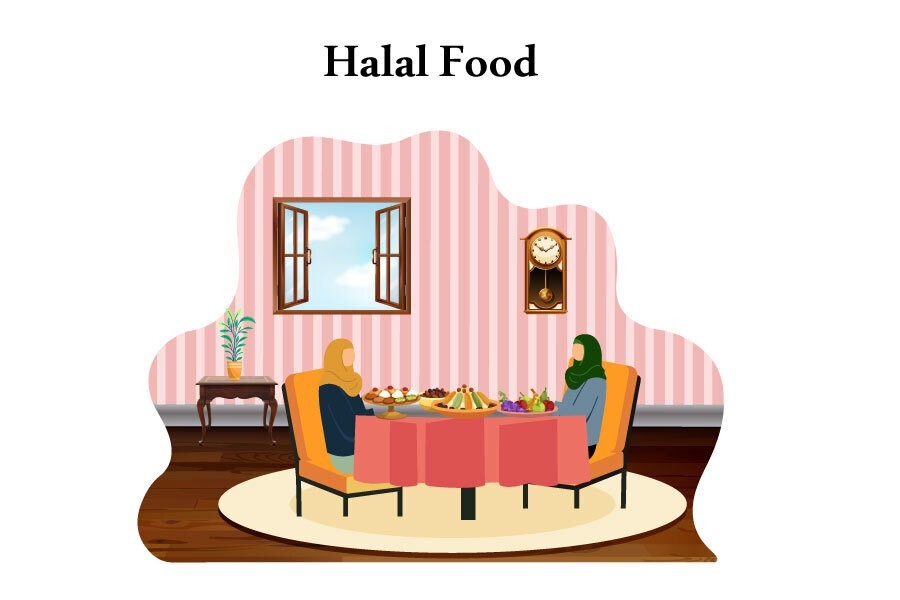Dive into the world of halal food, an intriguing culinary realm governed by Islamic principles. Often misconstrued in non-Muslim territories, what exactly makes food halal? Let’s unwrap the mystique behind its criteria and delve deep into the essence of what’s truly allowed on a Muslim’s plate.
What does Halal food mean?
Halal is an Arabic term meaning “permitted” or “lawful,” and it’s rooted in Islamic jurisprudence. It’s the antithesis of haram, which denotes something as forbidden or unlawful. While certain things are distinctly classified as halal or haram, some areas remain open for interpretation.
In the realm of food, the concept of halal bears similarities to the idea of “kosher” in Jewish traditions. However, halal principles span beyond just food, touching all facets of life.
Many non-Muslims are primarily acquainted with halal in the context of meat preparation. This awareness is largely due to the specific halal slaughtering practices that distinguish the meat as permissible. As a result, halal meat is often distinctly labeled in non-Muslim countries. Conversely, certain items like fruits and vegetables are inherently halal, making their classification less conspicuous to those unfamiliar with the concept.
The importance of Islamic culture
In Islamic culture, halal food holds significant importance as it embodies the divine commandments and principles of purity and righteousness outlined in the Quran. Consuming halal food is not just a dietary preference; it’s a testament to a Muslim’s commitment to their faith and their adherence to the teachings of Islam. Abstaining from haram (forbidden) items and opting for halal sustenance is an integral part of a Muslim’s daily life, strengthening their spiritual connection and ensuring they lead a life in harmony with God’s will. This emphasis on dietary laws underscores the holistic approach of Islam, where spiritual well-being is intertwined with physical actions and choices.
What are the Criteria for Halal Foods in Islam?
Halal foods are governed by Islamic dietary laws derived from the Quran, the Hadith (sayings of the Prophet Muhammad), and the rulings of Islamic scholars. Here are the primary criteria for halal foods:
-
Source of the Food:
The source of food is a pivotal factor in determining its halal status within Islamic dietary guidelines. Certain animals, such as pigs, are explicitly deemed haram (forbidden) in Islam. As such, not only is the meat of these animals prohibited, but any derivatives or by-products from them are also considered non-halal. Hence, devout Muslims must establish the origin of their food to ensure adherence to their religious beliefs and maintain the purity of their consumption.
-
Slaughter Method:
The method of slaughter for halal foods requires that animals be treated with kindness and compassion. To be deemed halal, the animal must be alive and healthy at the time of slaughter.
A Muslim individual, invoking the name of God, carries out the slaughtering process with a swift and clean cut to the animal’s throat using a sharp knife. This method ensures minimal suffering and allows for the complete draining of blood from the animal’s body. The act of draining the blood is essential in halal practices as consuming blood is prohibited in Islam. Throughout the process, reverence, gratitude, and mindfulness are emphasized, underscoring the sanctity of taking a life for sustenance.
-
Processing and Preparation:
Any tools, kitchen appliances, or surfaces that have come into contact with haram substances cannot be used to prepare halal food unless they have been thoroughly cleaned.
- Alcohol and Intoxicants:
In Islamic dietary laws, alcohol and intoxicants are strictly forbidden. Consuming or using products containing alcohol or its derivatives is considered haram (impermissible) because it impairs judgment and can lead one away from the teachings of Islam. This prohibition isn’t just limited to beverages; it also extends to food items, medicines, and other products that might contain alcoholic substances. The avoidance of these intoxicants reflects a Muslim’s commitment to maintaining a clear mind and living by their faith’s principles.
-
Cross-contamination:
Cross-contamination refers to the unintentional transfer of harmful bacteria or other microorganisms from one substance or object to another, potentially posing health risks.
In the context of halal foods, cross-contamination can also mean the inadvertent mixing or contact of halal products with non-halal substances. This can occur through shared use of kitchen tools, appliances, or surfaces that have been in contact with forbidden items, like pork or alcohol. Ensuring proper cleaning and separation is essential to prevent cross-contamination and maintain the purity of halal foods.
-
Additives and Ingredients:
In the realm of halal foods, the origin and nature of additives and ingredients are of paramount importance. Ingredients derived from forbidden sources, like pork, are strictly non-halal.
Furthermore, additives, emulsifiers, and preservatives sourced from non-halal animals or containing alcohol derivatives are not permissible in halal foods. It’s essential to ensure that every component in a food product conforms to halal standards, making the scrutiny of additives and ingredients crucial for those adhering to Islamic dietary laws.
-
Ethical Treatment:
While not a strict requirement, there’s an increasing emphasis on the ethical treatment of animals in halal practices. It is recommended that animals be treated humanely throughout their lives.
-
Certification:
Many countries have halal certification bodies that verify if a product meets halal standards. Products that have been certified will usually bear a halal logo.
How do we ensure Halal Food?
The modern halal food industry has experienced remarkable growth and diversification, driven by a rising global Muslim population and increasing demand for halal-certified products. With globalization, there’s greater awareness and accessibility to halal products, even in non-Muslim majority countries.
- Halal certification process
With the rise in global trade, how do we ensure what’s labeled Halal truly is? That’s where certification comes in. Recognized bodies inspect and verify products and practices, ensuring they meet strict Halal standards.
- Global Halal market trends
Did you know the Halal food market is booming? From niche to mainstream, the demand for Halal products is increasing globally, driven by both Muslim and non-Muslim consumers valuing ethical and clean food production.
- Common misconceptions about Halal
Think Halal is just about meat? Think again! It encompasses all aspects of life, from finance to cosmetics. It’s a holistic approach to living a pure life, rooted in centuries-old traditions yet adapting to modern needs.
Certified Halal Food Industries in the USA
The American Halal Foundation highlights an interesting trend: Despite the U.S. being home to over 3.45 million Muslims and numerous others embracing the halal way of life, the halal industry remains an untapped goldmine. By 2024, it’s anticipated to surge by an impressive USD 8.17 billion. Echoing this, the Islamic Food and Nutrition Council of America (IFANCA) noted that halal enthusiasts in the U.S. splurged roughly USD 20 billion on food alone in 2020. Yet, surprisingly, only a handful of producers are capitalizing on this lucrative segment, signaling a vast growth opportunity awaiting exploration in the nation.
List of the few Halal-certified industries in the USA
- American Foods Group, LLC
- Midamar Corporation
- Cresent Foods
- Saffron Road
- Nestle S.A.
Conclusion
Halal, a term deeply rooted in our faith, is more than just a dietary practice. It’s a representation of our unwavering commitment to the teachings of Islam and the desire to lead a life in alignment with God’s will. From understanding the intricacies of halal food preparation to recognizing the importance of ethical treatment in our practices, it’s clear that every facet of halal is imbued with a deeper meaning and purpose. As the modern world evolves, the halal industry, too, is expanding and diversifying.
With globalization, the demand for halal-certified products has surged, underscoring the need for rigorous certification processes. As consumers in this vast market, we must remain informed, dispelling misconceptions and promoting the true essence of halal. Remember, halal isn’t merely about what we consume; it’s a testament to our faith and a reflection of our relationship with the Divine. As we navigate through these changing times, let’s embrace the principles of halal with both understanding and pride, ensuring that our choices continue to mirror the sanctity and purity that Islam so beautifully emphasizes.
FAQ’s
- What does Halal mean in English?
Halal is an Arabic term that translates to “permissible” or “lawful” in English.
- Can Muslims eat Kosher foods?
While there are similarities between Halal and Kosher, they aren’t identical. Muslims should seek Halal certification but can consider Kosher foods when Halal options are unavailable.
- Is vegan food automatically Halal?
Not necessarily. While vegan foods avoid meat, they might contain alcohol or other non-Halal ingredients.
- How can I verify if a product is genuinely Halal?
Look for recognized Halal certification labels on the packaging.
- Why is alcohol forbidden in Islam?
Islam prohibits alcohol due to its potential harm to the mind, body, and spirit.

















